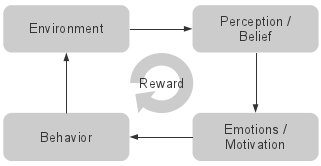One of the most insidious barriers to getting hard things done, part 3: why empathy gaps make sense
[This post is part of a series on empathy gaps. If you don’t see a Table of Contents to the left, click here to view the series, where you’ll get more value than reading just this post.]
As usual, understanding ourselves better helps us overcome the problems of empathy gaps — that when you feel one emotion you generally can’t conceive of your motivations when feeling a different emotion. Yet as they fundamentally concern being unable to understand things about ourselves, you’d think they were difficult to understand.
On the contrary, you can understand them if you understand your emotional system. Luckily we have an easy way to understand our emotional systems.
Empathy gaps depend on your emotional system
Also as usual, the Model explains this aspect of our emotional systems simply and thoroughly. Recall from this page this representation of the Model.

The Model says your emotions — that is, your motivations — depend on your environment, your perception, which is subject to your beliefs, and your behavior. Mostly your emotional system processes your perception of your environment as influenced by your beliefs to motivate your behavior.
Recall also that the Model says that our emotional systems evolved to help us survive in our environments. Note our emotions can only help us if they act in the moment. If a lion enters your environment and you have an emotional system that makes you feel scared five minutes later, you’ll probably get eaten before it acts.
Likewise, emotions can hurt us if they motivate us contrary to what would help us. So your emotional system not only doesn’t motivate you counterproductively, it prevents you from overriding it by not letting you access emotions besides the ones it thinks you want.
For example, you probably don’t like feeling hunger. Usually when you feel it you wish you didn’t feel it, which motivates you to satisfy it. If you could in any way choose not to feel it without satisfying it, you’d risk your life. Emotions motivate preserving your life, so an ability to dismiss or override emotions would risk your life.
So it makes sense we would have evolved an emotional system that gives you emotions that work in the moment and keep you from being able to feel any emotions besides the ones it thinks are right for the moment.
Look at the examples from two days ago and yesterday. Each one makes sense from an evolutionary perspective. For example, from an evolutionary perspective, animals like us, whose ancestors lived in environments without empty calories like our worlds, we should feel motivated to eat all we can of fatty and sugary foods. (From a health-in-today’s-world perspective we shouldn’t, but we inherit our emotional systems from our ancestors and that’s what we get.)
I hope this perspective helps make empathy gaps make sense. I think demystifying them and their origins helps make them less insidious and effective. It also points to how to overcome them, which I’ll cover tomorrow.
Read my weekly newsletter

On initiative, leadership, the environment, and burpees
Pingback: One of the most insidious barriers to getting hard things done, part 2: research and experiments | Joshua Spodek